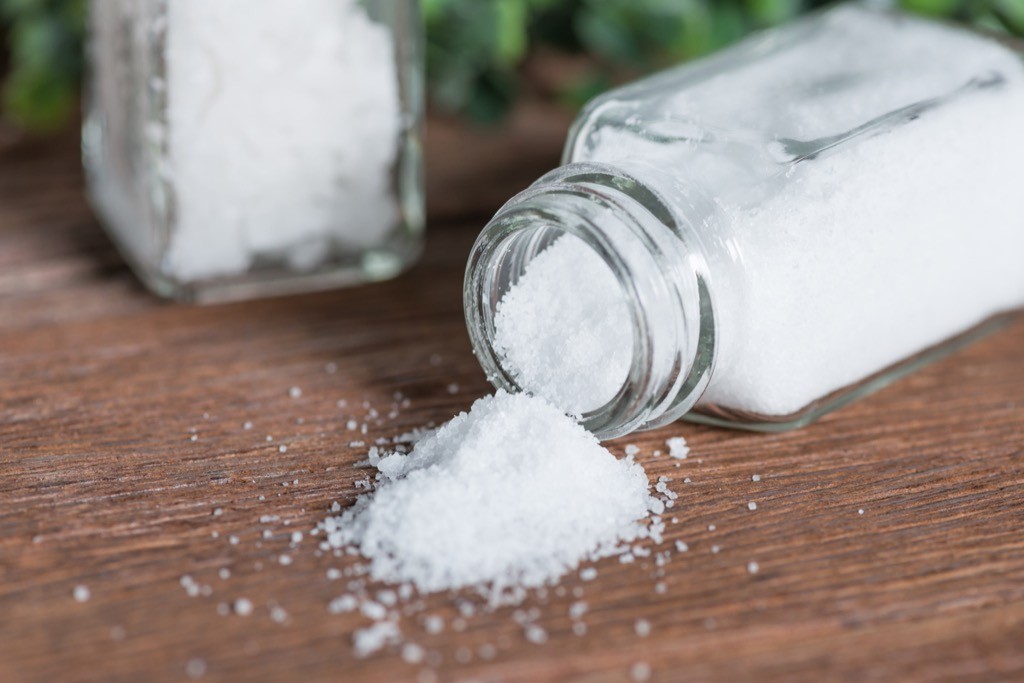WHO Raises Alarm on Common Kitchen Ingredient Linked to 1.9 Million Deaths a Year

Salt is a regular and beloved staple in most kitchens. It can be used for everything from boiling water faster to tenderizing meat, seasoning dishes, and fermenting foods. But, the World Health Organization (WHO) is cautioning that the common cooking helper is actually at the root of a global health crisis.
In new guidelines released January 27, 2025, the WHO recommends that people worldwide swap their usual table salt for lower-sodium alternatives in an effort to reduce high blood pressure and prevent millions of deaths a year from noncommunicable diseases. Read on to understand these new guidelines and why they affect you.
RELATED: Experts Raise Alarm on the Most Lethal Disease in America: “It’s Killing Every 34 Seconds”
Why Is the WHO Recommending Salt Substitutes?
Salt is contributing to a global health crisis that the WHO believes is avoidable. “Globally, each year 1.9 million deaths are attributable to high sodium intake,” the organization writes in a summary of their new guidelines.
Diets full of excess sodium can increase the risk of high blood pressure, which can lead to cardiovascular diseases (CVD), stroke, chronic kidney disease, and other potentially deadly medical conditions.
The global average of sodium intake is 4.3 grams per day, according to the most recent stats from 2019. This is twice the WHO’s recommended amount of 2 grams per day for adults, which is a guideline that’s been in place since 2012 and should be “adjusted downward based on the energy requirements of children.”
“Despite efforts made by Member States to achieve the global target to reduce population sodium intake by 30% by 2030, progress has been slow,” the WHO states. It admits that sodium chloride (NaCl) is still the “most common form of salt added to foods, both by consumers and in food manufacturing.”
To counteract the excessive consumption of sodium worldwide and reduce the risk of related diseases, the WHO is now recommending “urgent and accelerated actions” for everyone—from the average kitchen cook to major food manufacturers—to start adopting lower-sodium salt substitutes.
What Are Lower-Sodium Salt Substitutes?
In stores, you can find these under the labels “low-sodium salt,” “heart salt,” “mineral salt,” or “sodium-reduced salt.” The main LSSS the WHO recommends is potassium-enriched salt, which replaces sodium chloride with potassium chloride, has a similar taste, and offers several health benefits.
Potassium is an essential mineral found in foods like beans, peas, nuts, and green vegetables that has the ability to reduce blood pressure and the risk of CVDs. The WHO recommends consuming 3.5 grams of potassium per day, but most people fall short.
By replacing regular table salt with potassium-enriched salt, the worldwide population could prevent hundreds of thousands of deaths from cardiovascular disease each year, studies have shown.
The Challenges of Adopting Healthier Alternatives

However, there are some reasons why potassium-enriched salt hasn’t been widely adopted yet. The WHO reports that concerns have been raised about it’s safety “because too high a level of blood potassium (hyperkalaemia) may be harmful, especially to individuals with impaired kidney function.”
Research shows that this applies to a small portion of the global population, but still, they are exempt from the WHO’s new guidelines.
What’s more, according to The Conversation, LSSS are expensive and not widely available. Potassium-enriched salt, for instance, is only sold in 47 countries, sometimes at 15 times the price of regular salt.
The WHO admits these limitations, stating: “Main barriers for consumers include: limited availability of LSSS, higher price, lack of awareness, bad taste and lack of perceived health benefit. The higher cost of LSSS and the concerns around the potentially increased risk of hyperkalaemia in those with kidney disease are potential barriers preventing governments from promoting LSSS.”
How to Limit Your Salt Intake
You can consider switching to a lower-sodium salt substitute if you fit the WHO’s description of an adult who is not pregnant and does not have a kidney impairment that might compromise potassium excretion.
RELATED: 7 Signs Your Diet Is Secretly Packed With Salt
Other methods to reduce your salt intake include eating more fresh fruits, vegetables, and lean proteins, which are naturally low in sodium. At the same time, avoid processed foods, which can contain excessive amounts of hidden sodium.
Make your meals at home to control how much salt you’re using, and if you’re buying canned or packaged goods, look for “low-sodium” or “no-salt-added” options. When dining out, ask for less salt when ordering, or choose grilled, steamed, or roasted menu options over fried foods, which are packed with salt.
Making small changes like these can significantly lower your sodium intake, helping to reduce your risk of high blood pressure, heart disease, and stroke.